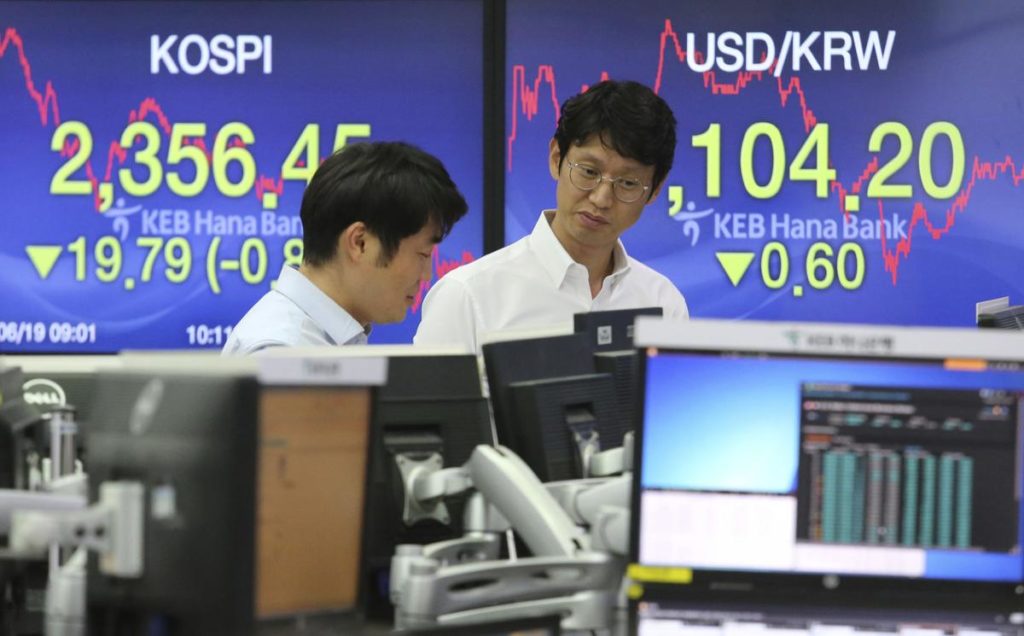Global stock markets fell Tuesday after U.S. President Donald Trump escalated a dispute with China over technology policy by threatening a tariff hike on an additional $200 billion of Chinese goods.
KEEPING SCORE: Germany’s DAX was down a sharp 1.3 percent to 12,673 and France’s CAC 40 fell 1.1 percent to 5,394. London’s FTSE 100 lost 0.4 percent to 7,598. Wall Street looked poised for heavy losses, with the future for the Dow Jones industrial average off 1.3 percent and that for the Standard & Poor’s 500 index down 1.1 percent.
ASIA’S DAY: The losses were even heavier in Asia, where the Shanghai Composite Index fell 3.8 percent to 2,907.82 and Hong Kong’s Hang Seng lost 2.8 percent to 29,468.15. Tokyo’s Nikkei 225 retreated 1.8 percent to 22,278.48 and Seoul’s Kospi gave up 1.5 percent to 2,340.11. India’s Sensex shed 0.6 percent to 35,331.28 and Sydney’s S&P-ASX 200 declined 0.6 percent to 6,102.10.
TRADE TENSIONS: Trump directed the U.S. Trade Representative to prepare new tariffs on $200 billion in Chinese imports, stepping up a dispute companies and investors worry could drag down global trade and economic growth. Trump accused Beijing of being unwilling to resolve the dispute over complaints it steals or pressures foreign companies to hand over technology. China’s Commerce Ministry criticized the White House action as blackmail and said Beijing was ready to retaliate.
ANALYST’S TAKE: “President Donald Trump’s unwillingness to back down became apparent this morning, once again sinking markets,” Jingyi Pan of IG said in a report. Pan said market attention turned to China for “signs of further retaliation.”
ENERGY: Benchmark U.S. crude lost 88 cents to $64.97 per barrel in electronic trading on the New York Mercantile Exchange. The contract rose 79 cents on Monday to $65.85. Brent crude, used to price international oils, fell 47 cents to $74.87 per barrel in London. The contract rose $1.90 the previous session to $75.34.
CURRENCY: The dollar declined to 109.75 yen from Monday’s 110.54 yen. The euro edged down to $1.1552 from $1.1623.
(AP)












3 Responses
Raising tariffs in 1930 worked well. It’s what made the depression “Great” (and Trump does favor “greatness”). It also helped lead to Hitler getting elected in Germany (due to international impact of tarif increases).
akuperman – for once we agree, but I think your sarcasm will be lost on people who haven’t learned history. My parents lived through the depression, and my older sisters grew up during it, so for me it’s family history – and this tariff business scares me.
History lesson: After the stock market crashed (think 2008 but worse) the Republican president tried to protect US industries by raising tariffs much higher. As a result, world trade was trashed, inflation became rampant around the world, and the Depression did indeed become “Great.” The economic catastrophe and hyper-inflation led to the situation in Germany where people voted for the Nazis in desperation because the German economy had crashed and most people were out of work, in a country where your job was your identity.
The President is only worried about imports and trade deficits. He needs to worry about exports and trade in general. If this goes where I’m afraid it’s going to, it will make 2008 look like a walk in the park.
That idiot in the White House is clueless about the world economy. Liddle Donald is leading us into a great depression.